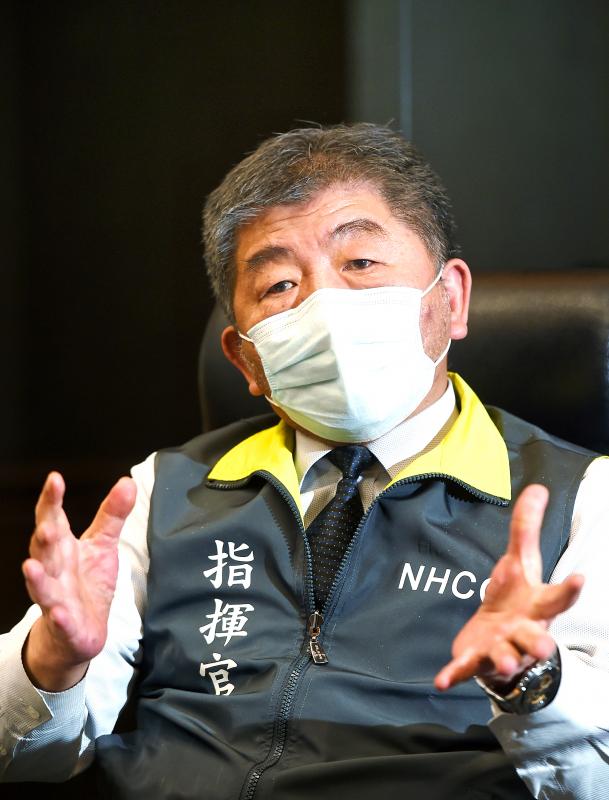The government would begin easing some border restrictions by Wednesday at the earliest, Central Minister of Health and Welfare Chen Shih-chung (陳時中) said on Saturday.
The new measures would include allowing the entry of foreign business travelers, Chen, who heads the Central Epidemic Command Center (CECC), said in an interview with the Liberty Times (the Taipei Times’ sister newspaper).
Those entering on business visas would be subject to the same quarantine rules as returning Taiwanese nationals, he said.

Photo: Fang Pin-chao, Taipei Times
However, if special circumstances arise, the CECC would establish “business travel bubbles” under which business travelers would be subjected to shorter quarantine periods, he said.
COVID-19 “measures must be implemented scientifically. Tightened rules are introduced step by step, and now loosening of the rules must also be done step by step,” he said. “If there are no unforeseen circumstances, then we will move toward reducing the barriers to border entry.”
Borders are currently open only to foreigners with residence permits, special diplomats and those on humanitarian missions. Under the new rules those who meet the requirements of a business visa would also be allowed entry, with no consideration for which country they are arriving from, he said.
Quarantine periods would be gradually reduced to 10 days from the current 14 days, according to safety considerations, he said, adding that where arrivals are quarantined — whether in a central facility, quarantine hotel or residence — would depend on the number of COVID-19 vaccine doses they have had.
“There is already scientific evidence that those who do not test positive for COVID-19 within a 10-day period are not a transmission risk to others,” he said.
The CECC is moving toward increasing the ratio of home quarantine, he said, adding that its is the most cost-effective and convenient solution for people, and the public has been cooperative in following home-quarantine rules.
“If people are fully vaccinated and are able to stay in a residence on their own, or in one room of a residence on their own throughout the quarantine period, then a longer home-quarantine period is feasible,” he said. “However, we have to take things one step at a time.”
Since international arrivals need to book airline tickets, quarantine hotels and make other arrangements that might be difficult to change on short notice, the CECC would update the quarantine regulations monthly, instead of every two weeks as is currently done, he said.
Loosened border restrictions would be accompanied by increased testing, and rapid testing kits for use in the home would be the first line of screening, he said.
Asked about opening borders to tourists, Chen said that would not happen until later, and business travelers are the government’s first priority.
“The impact of lost business deals will spill over into the following years, but tourists who do not come this year could still come next year,” he said.
Additional reporting by Yang Yuan-ting and Chiu Chih-jou

CHAOS: Iranians took to the streets playing celebratory music after reports of Khamenei’s death on Saturday, while mourners also gathered in Tehran yesterday Iranian Supreme Leader Ayatollah Ali Khamenei was killed in a major attack on Iran launched by Israel and the US, throwing the future of the Islamic republic into doubt and raising the risk of regional instability. Iranian state television and the state-run IRNA news agency announced the 86-year-old’s death early yesterday. US President Donald Trump said it gave Iranians their “greatest chance” to “take back” their country. The announcements came after a joint US and Israeli aerial bombardment that targeted Iranian military and governmental sites. Trump said the “heavy and pinpoint bombing” would continue through the week or as long

TRUST: The KMT said it respected the US’ timing and considerations, and hoped it would continue to honor its commitments to helping Taiwan bolster its defenses and deterrence US President Donald Trump is delaying a multibillion-dollar arms sale to Taiwan to ensure his visit to Beijing is successful, a New York Times report said. The weapons sales package has stalled in the US Department of State, the report said, citing US officials it did not identify. The White House has told agencies not to push forward ahead of Trump’s meeting with Chinese President Xi Jinping (習近平), it said. The two last month held a phone call to discuss trade and geopolitical flashpoints ahead of the summit. Xi raised the Taiwan issue and urged the US to handle arms sales to

State-run CPC Corp, Taiwan (CPC, 台灣中油) yesterday said that it had confirmed on Saturday night with its liquefied natural gas (LNG) and crude oil suppliers that shipments are proceeding as scheduled and that domestic supplies remain unaffected. The CPC yesterday announced the gasoline and diesel prices will rise by NT$0.2 and NT$0.4 per liter, respectively, starting Monday, citing Middle East tensions and blizzards in the eastern United States. CPC also iterated it has been reducing the proportion of crude oil imports from the Middle East and diversifying its supply sources in the past few years in response to geopolitical risks, expanding

Pro-democracy media tycoon Jimmy Lai’s (黎智英) fraud conviction and prison sentence were yesterday overturned by a Hong Kong court, in a surprise legal decision that comes soon after Lai was jailed for 20 years on a separate national security charge. Judges Jeremy Poon (潘兆初), Anthea Pang (彭寶琴) and Derek Pang (彭偉昌) said in the judgement that they allowed the appeal from Lai, and another defendant in the case, to proceed, as a lower court judge had “erred.” “The Court of Appeal gave them leave to appeal against their conviction, allowed their appeals, quashed the convictions and set aside the sentences,” the judges